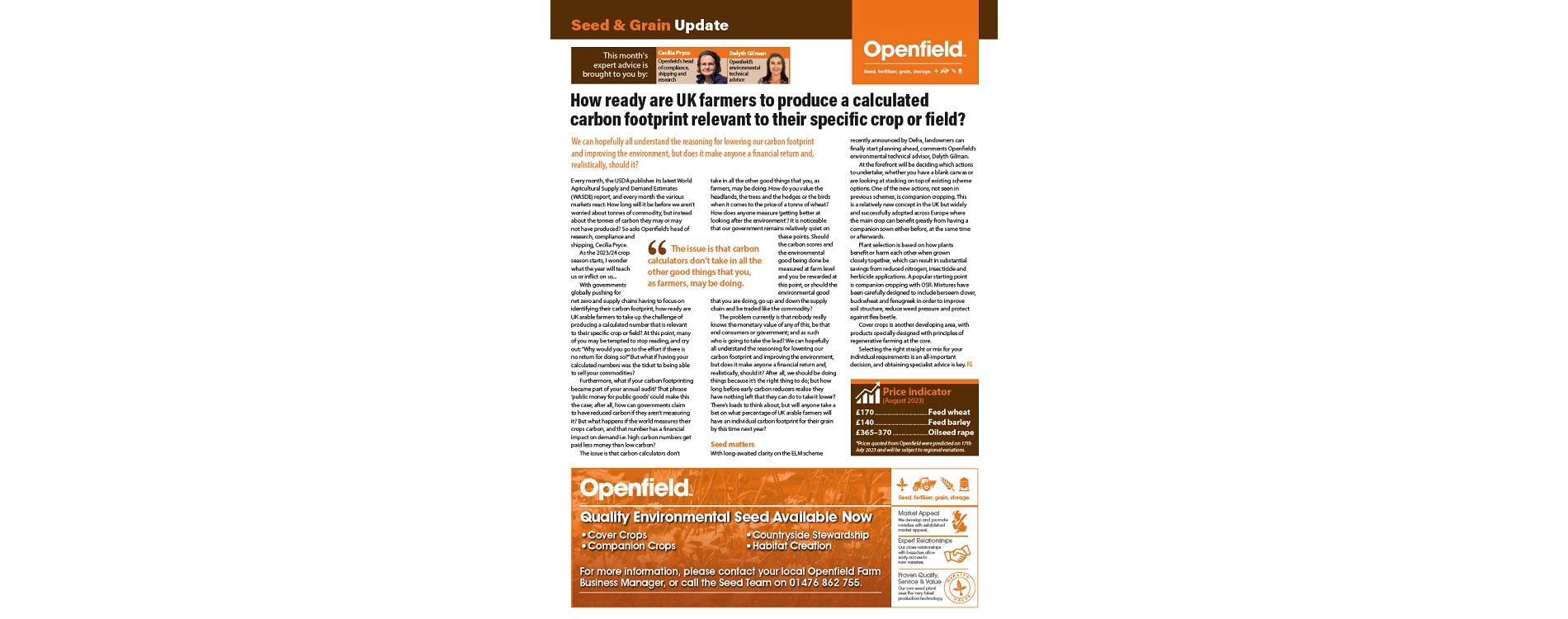How ready are UK farmers to produce a calculated carbon footprint relevant to their specific crop or field?
We can hopefully all understand the reasoning for lowering our carbon footprint and improving the environment, but does it make anyone a financial return and, realistically, should it?
Every month, the USDA publishes its latest World Agricultural Supply and Demand Estimates (WASDE) report, and every month the various markets react. How long will it be before we aren’t worried about tonnes of commodity, but instead about the tonnes of carbon they may or may not have produced? As the 2023/24 crop season starts, I wonder what the year will teach us or inflict on us…With governments globally pushing for net zero and supply chains having to focus on identifying their carbon footprint, how ready are UK arable farmers to take up the challenge of producing a calculated number that is relevant to their specic crop or field? At this point, many of you may be tempted to stop reading, and cry out: “Why would you go to the effort if there is no return for doing so?” But what if having your calculated numbers was the ticket to being able to sell your commodities?
Furthermore, what if your carbon footprinting became part of your annual audit? That phrase ‘public money for public goods’ could make this the case; after all, how can governments claim to have reduced carbon if they aren’t measuring it? But what happens if the world measures their crops carbon, and that number has a financial impact on demand i.e. high carbon numbers get paid less money than low carbon? The issue is that carbon calculators don’t take in all the other good things that you, as farmers, may be doing. How do you value the headlands, the trees and the hedges or the birds when it comes to the price of a tonne of wheat? How does anyone measure ‘getting better at looking after the environment’? It is noticeable that our government remains relatively quiet on these points. Should the carbon scores and the environmental good being done be measured at farm level and you be rewarded at this point, or should the environmental good
that you are doing, go up and down the supply chain and be traded like the commodity?
The problem currently is that nobody really knows the monetary value of any of this, be that end consumers or government; and as such who is going to take the lead? We can hopefully all understand the reasoning for lowering our carbon footprint and improving the environment, but does it make anyone a financial return and, realistically, should it? After all, we should be doing
things because it’s the right thing to do; but how long before early carbon reducers realise they have nothing left that they can do to take it lower?
There’s loads to think about, but will anyone take a bet on what percentage of UK arable farmers will have an individual carbon footprint for their grain by this time next year?
Seed matters
With long-awaited clarity on the ELM scheme recently announced by Defra, landowners can finally start planning ahead, comments Openfield’s environmental technical advisor, Delyth Gilman.
At the forefront will be deciding which actions to undertake, whether you have a blank canvas or are looking at stacking on top of existing scheme options. One of the new actions, not seen in previous schemes, is companion cropping. This is a relatively new concept in the UK but widely and successfully adopted across Europe where the main crop can benefit greatly from having a
companion sown either before, at the same time or afterwards.
Plant selection is based on how plants benefit or harm each other when grown closely together, which can result in substantial savings from reduced nitrogen, insecticide and herbicide applications. A popular starting point is companion cropping with OSR. Mixtures have been carefully designed to include berseem clover, buckwheat and fenugreek in order to improve soil structure, reduce weed pressure and protect against flea beetle.
Cover crops is another developing area, with products specially designed with principles of regenerative farming at the core. Selecting the right straight or mix for your individual requirements is an all-important decision, and obtaining specialist advice is key.




